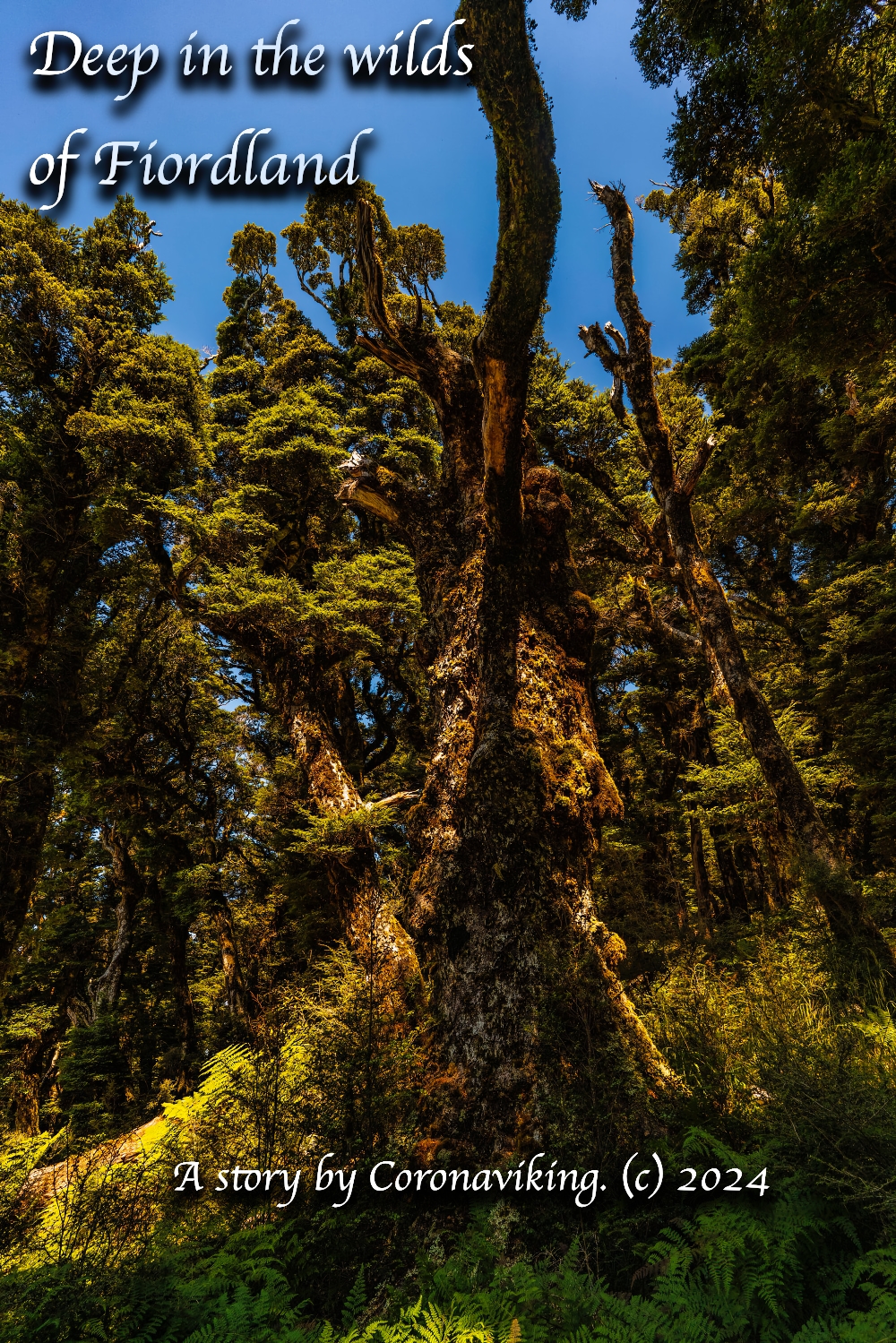

Annotation:
“Deep in the Wilds of Fiordland” is an immersive nature memoir that follows a solo journey through the untouched wilderness of New Zealand’s Fiordland. Inspired by the introspective spirit of Thoreau, Muir, and Dillard, this poetic narrative explores themes of solitude, self-discovery, and connection to nature’s raw beauty, reflecting the timeless ideas of transcendentalism. From traversing dense rainforests to contemplating life by pristine lakes, this story invites readers to experience the serenity and transformative power of true wilderness adventure.Table of contents:
It was in the beginning of February, deep in the midst of summer, when I arrived in Fiordland, on the South Island of New Zealand. The small town of Te Anau was my starting point, a place that seemed to exist on the edge of the world, where civilization met the untamed wilderness. As I got out of my car and looked around, I could feel the energy of the town, the hum of excitement in the air. The forecast had promised a rare window of clear weather, and everyone seemed eager to take advantage of it. Visitors and residents alike were bustling about, preparing for their hikes, most of them setting off on the famous Milford Sound Track. The trail led through the valley, winding its way between towering peaks, connecting the fjord that gave it its name to the lake that Te Anau called home.
This route, I soon learned, was the epitome of organized leisure: a well-maintained path, dotted with comfortable mountain huts that promised respite at regular intervals, a place where the wanderer could rest, sheltered from the elements. It was the sort of adventure neatly packaged for convenience, where the unpredictability of nature was tamed by human hands. But for me, such a journey held little appeal. The very idea of following a trail worn smooth by countless feet, of sharing the quiet majesty of the land with crowds of chattering tourists, struck me as a kind of surrender to the banal, a relinquishing of the true spirit of exploration.
I had come here seeking something different, something deeper. My gaze turned toward a more remote destination, a place where few dared to tread. My goal was a little-known lake, hidden behind an impassable ridge on the far side of the fjord. The name of the lake, though whispered in the occasional conversation among locals, remained absent from the brochures and guidebooks that filled the visitor centers. It was a place where the land remained untouched, a wild and uncharted territory, where no roads led, no trails guided, and no huts offered comfort. There, I believed, I could step away from the trappings of modern life and immerse myself fully in nature’s solitude, unencumbered by the distractions of crowds, and, more importantly, by the noise within my own mind
The idea of venturing into this wilderness stirred something primal within me. It was not just a desire to escape but a longing to confront the raw, untamed beauty of the world, and in doing so, to confront myself. There is a certain truth one can only find in the wild—when the noise of civilization fades away and one is left alone with the rustle of wind through the trees, the rhythm of one’s own breath, and the steady pulse of the earth beneath bare feet. In such moments, I had often found clarity, the quiet revelation of my place in the world, not as a conqueror of nature but as a humble participant in its endless cycles of life and death, growth and decay.
I was driven by a need to reconnect with this ancient rhythm, to remind myself of the simplicity and purity of existence that is so easily lost in the clutter of modern life. In the wilderness, there are no deadlines, no demands, no distractions. There is only the present moment, unfolding as it always has, at nature’s pace. It is here, in this stillness, that I hoped to find a kind of freedom—freedom not only from the trappings of society but from the restless thoughts that so often cloud the mind.
With this in mind, I set about preparing for the journey. As the town of Te Anau wound down for the evening, I swiftly packed my backpack, filling it with only the essentials: a tent, a few days’ provisions, and my most trusted companions—my camera, a well-worn journal and a map, though I knew its use would be limited in the trackless wilderness that awaited me. The excitement of the adventure ahead hummed quietly in my chest, but there was no rush, no need for haste. I was seeking not a destination but an experience, a slow and deliberate movement through the land, where each step was an opportunity to observe, to reflect, to simply be.
By nightfall, everything was in place, ready for the morning’s departure. As I lay in my bed that night, the quiet hum of the town outside my window, I felt a calm anticipation settle over me. Tomorrow, I would leave behind the comforts of human company and enter a world governed by its own quiet laws, where the only path forward was the one I would create with my own feet. It was a world where, perhaps, I could rediscover something essential that lay buried beneath the layers of modern life—a deeper connection to nature, and through it, a deeper connection to myself.
The next morning, the first light found me driving toward the Hollyford River, the sky clear and bright with promise. I parked near the Moraine Creek Swing Bridge, a humble structure over the swift waters, and left behind the last vestiges of civilization. From this point onward, the wild held dominion, and I, a mere guest.
The sun filtered through the clouds, casting a warm, golden light over the valley, and the day carried with it a freshness that seemed to invite exploration. After crossing the Hollyford River on the narrow swing bridge, I entered a world wholly different from the open landscapes I had left behind—a realm of damp, moss-covered wonders, the ancient temperate rainforest that cloaked these lands in its primal beauty. The moment my feet left the wooden planks of the bridge, it was as if I had stepped into another era, a place where time itself slowed to the rhythm of the natural world.
The forest was a dense, living labyrinth, alive with a complexity that spoke of millennia of undisturbed growth. Giant beech trees loomed overhead, their gnarled and twisting branches reaching out in intricate patterns, as if tracing forgotten paths in the sky. Silver beech and mountain beech mingled with the occasional giant red beech, their trunks thick with age, draped in mosses that shimmered in hues of green so vivid they seemed to glow in the filtered sunlight. Each tree appeared to bear the weight of time, as though the forest itself was a living relic from an ancient world. I half-expected to glimpse a dinosaur moving among the shadows, so immense and primeval was the landscape.
The ground beneath my feet was soft, yielding, as if the forest floor itself breathed with life. Everywhere I looked, mosses and ferns clung to the earth and climbed the trees, weaving themselves into the trunks and stones with wild abandon. It was a world of layers—an ecosystem within an ecosystem. The lower canopy of the forest was thick with ferns, their fronds unfurling in delicate spirals, while the higher branches were heavy with lichen and festooned with filmy ferns that caught the light like jewels. The intricate latticework of vegetation created a living cathedral, where even the stillness seemed alive, whispering with the faint rustle of leaves and the occasional soft murmur of a distant stream.
The air was humid, thick with the scent of wet earth and decaying wood, mingled with the subtle sweetness of wildflowers that bloomed in the hidden crevices of the forest. There was something intoxicating in the mix, a fragrance that filled my lungs with every breath and connected me to the deep, mysterious pulse of the rainforest. Every step I took stirred up the moist ground beneath me, and with it rose the rich, earthy scent of peat, mingling with the more delicate aroma of mosses and the occasional whiff of stale flowers that had fallen from the high branches.
As I walked through this verdant maze, it felt as if the forest itself was watching. Delicate butterflies, their wings painted with vibrant colors, danced lazily in the sunbeams that pierced through the dense canopy. Birds flitted between the trees, their songs high and strange, echoing off the walls of foliage like ancient, forgotten languages. Now and again, a flash of color—an amber breast, an emerald tail—would catch my eye, as birds passed quickly through the branches. Their calls were at once distant and near, a haunting symphony that filled the spaces between my thoughts, urging me deeper into the heart of the forest.
Everywhere around me, life thrived in layers upon layers of growth. The shrubs and smaller trees—Coprosma, broadleaf, five-fingered—filled the spaces between the towering giants, their leaves dripping with moisture. Some of the trees seemed to grow straight out of the marshy ground, their roots tangled and thick, defying the swampy terrain. I marveled at the resilience of these plants, how they had adapted to this watery, sodden world, how they seemed to flourish where other life might wither. The dense undergrowth, vibrant with Blechnum ferns, formed a thick carpet at my feet, and I moved cautiously through it, avoiding the deep mud holes that dotted the path like hidden traps.
The further I went, the more I became attuned to the forest’s rhythm. The occasional crack of a branch, the distant rush of water from a creek, and the near-silent whisper of the wind in the leaves all blended together into a symphony of nature’s design. Time seemed to lose meaning in this place. The thick, mossy limbs of the trees formed natural arches overhead, like the ribs of some ancient beast, long since petrified into the fabric of the forest. Here, I was not just an observer—I was a part of this grand, untamed world.
Eventually, the air grew cooler, the dense mist of the forest clinging to my skin like a second layer, as I neared the edge of Moraine Creek. The roar of the stream grew louder, a rushing torrent of azure water, born in the glaciers far above, tumbling down in a series of cascades, carving its way through the ancient forest like a forgotten artery of the earth itself. As I stood there, gazing into the crystal-clear depths, the forest seemed to exhale, as though it had been holding its breath, waiting for me to notice its magnificence.
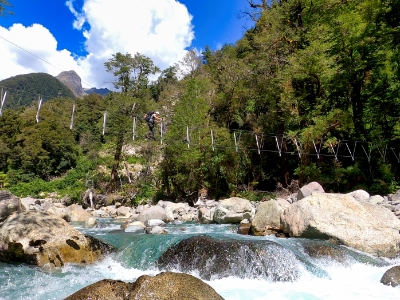
The bridge that spanned the creek was a precarious one—three steel cables stretched across the furious waters, one to step on, and two to grasp with your hands. It was a challenge to balance with a heavy 70-liter pack on my back. As I walked, the wind tugged at me, and the water below, with its deafening roar, seemed to mock my efforts. I moved like a tightrope walker, focused, every movement deliberate, for I knew that a misstep could result in more than just a fall—it could sweep me into the icy depths.
Reaching the other side brought a profound sense of relief, as if I had passed a trial the land had set before me. I knelt by the creek, filled my bottle with its crystalline waters, and drank deeply. Lying on the rocky shore, I let the exhaustion wash over me as I caught my breath. It seemed the earth itself was exhaling, as the trees swayed gently in the breeze
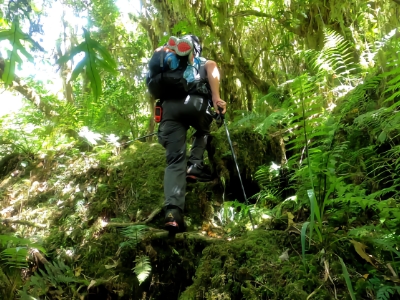
The ascent began after that—a steady climb up a slope thick with jungle. Here, the roots of trees tangled beneath my feet like serpents, making each step a careful one. I was surrounded by a dense, humid world. The air was heavy, thick, and alive with the pulse of unseen creatures. Sweat clung to my skin, and I felt the slow drain of energy as I climbed. The way forward was hard-earned, pushing through vines and stepping over roots, each one a reminder of how the earth challenges us.
But nature, in its benevolence, often grants reprieves. After a time, I emerged from the dense undergrowth into a lighter, more open forest. A breeze stirred the leaves, bringing with it a refreshing coolness. Small streams trickled alongside the trail, their waters laughing softly as they meandered through the forest floor. Shafts of sunlight broke through the canopy, casting golden light on the mist that hung in the air like a veil. It was as if the land itself was offering me a gift, replenishing my spirit after the trials of the jungle.
I came to a stream, clear and beautiful, its cascades flowing over rocks into pools that shimmered in the dappled sunlight. Without hesitation, I stripped off my clothes and plunged into one of the pools, the cool water a balm against the heat and exertion of the climb. For a moment, I was weightless, suspended in the water, and all the fatigue of the journey melted away. The water, so cold and pure, seemed to cleanse not just my body but my very soul. I floated there, in the stillness of the pool, and let the quiet wash over me.
Resting on the rocks afterward, I closed my eyes, listening to the sounds of the forest—the gurgle of the stream, the rustle of leaves in the breeze, the distant call of birds. Then, unexpectedly, a song broke through the stillness. An unknown bird, perched on a branch above me, began to trill, its voice carrying high and clear. Soon, others joined in, and for nearly half an hour I lay there, enveloped in the symphony of the forest—a divine opera that seemed to be performed just for me.
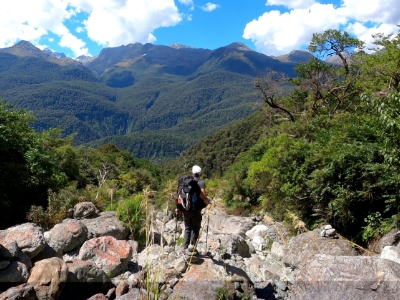
I continued my climb, my legs still weary but my spirit lighter. The path took me higher still, until at last I stood upon the edge of a cliff where the valley of the Hollyford River lay sprawling before me in majestic splendor. From this vantage, the world opened like a great living canvas. The rainforest below, ancient and impenetrable, was wrapped in a gossamer veil of mist, as if the earth itself still exhaled the dreams of the night. The fog clung to the tops of the trees, swirling slowly, a ghostly river of clouds winding through the dense canopy. It moved with a quiet grace, following the hidden contours of the land, revealing and concealing in turn the green depths of the forest.
The sun, now perched high at its zenith, poured golden light down upon the valley, each beam cutting through the mist like an artist’s brush, casting shadows and illuminating the landscape in hues of vibrant emerald and deep amber. Every leaf glistened as though dipped in gold, the whole forest alive with light. It shimmered as if breathing, a vast and living organism, whose slow pulse I could almost feel beneath my feet. From where I stood, I could see how the Hollyford River wound its way through the heart of the valley, its waters a blue ribbon woven into the fabric of the forest.
Below, the air was filled with the sounds of life—yet the birds flew beneath me, an unusual sensation, as though I had taken my place above the creatures of the earth. Their calls echoed upwards, strange and unfamiliar, piercing the still air. The birds themselves were like living embers, darting between the trees, their plumage glinting in the sunlight—flashes of red, gold, and blue against the endless sea of green. Some soared gracefully, riding the invisible currents that drifted over the valley, while others darted through the forest below with purpose and speed. Their cries were wild, untamed, a music born of the earth itself, and I stood in awe at the wonder of it all.
I lingered there, at the edge of the precipice, feeling as though I had stepped outside of time. There was a stillness here, a sacred quiet that no human presence could disturb. The valley before me was not just a landscape; it was a moment captured in eternity. The mist, the light, the soaring birds, all seemed to dance together in perfect harmony, untouched by the world below. For a long while, I simply stood, breathing in the pure air and letting my mind wander, content to be a silent observer in this vast, timeless theater of nature.
In that moment, the world felt immense, yet deeply intimate—every detail, every beam of light and every shadow, seemed to speak to something eternal within me. It was as if the valley itself had been waiting, all these centuries, for someone to stand where I stood and bear witness to its quiet glory. And in that space of stillness, I understood—this was the world as it should be, untouched, unspoiled, alive with its own quiet perfection.
Overcome by the beauty, I lay down on the soft grass, feeling the pulse of the earth beneath me. There is something profound in such moments, when the grandeur of nature stretches out before you and reminds you of your smallness. And yet, in that smallness, there is a quiet peace, a sense of belonging to something much larger.
I must have dozed off, for I was brought back to consciousness by a rustling behind me. A Kea parrot had taken an interest in my backpack and, with the curiosity of its kind, was helping itself to a dried fruit from my provisions. I smiled at the scene and offered it more. We ate together in that quiet moment, sharing the simplest of meals—dried fruit and cheese—foods that nourished without burden. There was a certain wisdom in this simplicity, in avoiding the excesses that so often weigh us down, both in body and spirit.
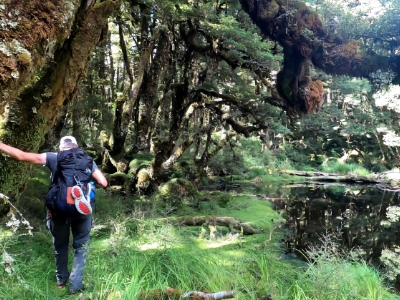
After my meal, I pressed on, moving through a forest that seemed almost enchanted. The trees here were gnarled and ancient, their limbs draped in moss of every shade, from bright greens to deep reds. It was a place where the earth seemed older, wiser—a place where one could lose all sense of time.
Eventually, I came upon a small, mirror-like lake, its waters stained brown from peat, reflecting the towering rock face on the opposite shore. The surface was so still, so perfect, that it seemed as though the lake was holding its breath, waiting. I sat by its edge, watching white herons pick their way through the shallows. The area around the lake was strewn with boulders, each one draped in moss and fern, creating a scene that was both wild and serene. The trees here grew in strange, fantastical shapes, their trunks twisted and covered in moss that seemed to glow in the sunlight.
I climbed onto a thick branch and, cradled by the soft moss, I dozed off. Sleep in the wilderness is different—it restores not just the body, but the soul, aligning one's rhythm with the earth. After about twenty minutes, I awoke, feeling refreshed, and continued my journey
The trail faded as I pressed beyond the lake, vanishing into the wild, uncharted marshlands that stretched out before me like a labyrinth of unknowns. Here, where human footsteps seldom fell, I entered the true wilderness—a marshy plateau, vast and indifferent, its surface undulating with a deceptive softness. The hours stretched on as I cautiously picked my way through this watery expanse, my movements slow and deliberate, each step a test of the ground beneath me. The boggy earth seemed to shift and sink with every footfall, an ever-present reminder of the precariousness of my path.
The swamp around me was a canvas of muted colors, painted in hues of yellowed moss and rusty browns. The ground, thick with moisture, felt more like a sponge than solid earth. It heaved and sighed beneath my weight, as if the very land resented my intrusion. Mosses, heavy with water, covered the surface in thick, springy layers that swayed like a mattress filled to the brim with liquid. I could see the surface ripple with each tentative step I took, and I knew that beneath this veil of moss lay treacherous depths—deep, bottomless bogs waiting to claim the careless or the unwary.
But there was hope in this landscape, too, though it came in small, isolated forms: the sedge hummocks, those clumps of grass whose roots formed solid, almost reliable islands in the sea of the swamp. They were scattered haphazardly, like stepping stones placed by nature herself, guiding me across the morass. Yet, the journey was far from straightforward. My boots, soaked and caked in mud, squelched with every step, and I could feel the wetness seeping into my skin, chilling me to the bone. Occasionally, I was forced to veer off my course, detouring around great expanses of open bog, where no hummock or firm ground could be found. Each detour lengthened my path, wearing on my patience, and testing my endurance.
The danger of the swamp was always close at hand. One misstep and I could disappear beneath the surface. That reality struck when I leapt to what seemed like a sturdy hummock, only to find it soft and unstable. I lost my balance, and with a lurch, I plunged down onto the thin layer of moss, a fragile barrier between me and the watery depths below. For a moment, terror gripped me, my heart racing as I lay sprawled, feeling the ground shift beneath me, the bog’s dark grip just inches away.
But then, something unexpected happened. Instead of sinking, I stayed aloft on the mossy surface, floating as if weightless, gently rocking as the soft earth swayed beneath me. The terror was still there, sharp and immediate, but so too was something else—a strange, unexpected delight. Lying there, I felt as though I had stepped out of time, out of gravity itself, suspended between the worlds of air and water. The moss, warm from the sun's rays, felt soft and velvety against my skin, a curious comfort amid the peril. It seemed to cradle me, offering a momentary reprieve from the danger lurking below.
As I lay still, I began to notice the intricate beauty of the world around me. Inches from my face, the surface of the moss revealed an entire microworld—tiny lichens of brilliant, unearthly colors, interwoven like delicate lace. Their patterns were mesmerizing, a surreal web of life that clung to the moss like a miniature forest. I had never seen such vibrant shapes, nor imagined that the swamp could harbor such exquisite beauty. There, in that moment, the fear receded, replaced by a quiet awe, a profound appreciation for the marvels that lay hidden in the smallest corners of the natural world.
But beauty, however captivating, could not erase the danger. Slowly, cautiously, I began to move. I crawled forward on my belly, spreading my weight across the fragile surface, inching my way toward the nearest hummock. My senses sharpened, my mind cleared of all but the task at hand. The fear, though still present, no longer paralyzed me. Instead, it fueled my concentration, heightening my awareness of every shift, every tremor beneath me. The world shrank to the patch of moss in front of my eyes, the distant hummock looming like salvation. It was as though time itself had slowed, each second stretching into an eternity as I inched my way toward safety.
Finally, after what felt like hours but could have only been minutes, I reached solid ground. My hands gripped the rough surface of the hummock, and I pulled myself up, breathing deeply, my chest heaving with the relief of having escaped the bog’s grip. I stood, my legs trembling, not just from the physical exertion but from the emotional release of narrowly avoiding disaster.
As I continued on my way, a strange peace settled over me. The swamp, though dangerous, had revealed its secret beauty to me, and in its harshness, I had found a kind of grace. Every step from then on, though cautious, was filled with a deeper sense of gratitude. The moss that had threatened to swallow me had also shown me a world of wonder. And as I walked, muddy and wet but alive, I could not help but feel a strange connection to the land, a shared pulse with the ancient forces that shaped this wild, untamed place.
When I finally emerged from the swamps and stepped onto firm ground, the evening had already begun its quiet descent into night. The world around me was dimming, with the last remnants of daylight clinging to the horizon like a fading ember. I found a small, flat patch of land, nestled between the towering trees, and set about pitching my tent. Each motion felt deliberate and unhurried, as if the earth itself was guiding my hands, reminding me of the timeless ritual of preparing a place to rest. Once the tent stood firmly, a humble shelter against the vast wilderness, I turned my attention to gathering firewood. The promise of a fire, with its warmth and light, seemed to beckon, a beacon of companionship in the solitude of the wild.
Entering the twilight forest, I felt as though I had crossed into another realm entirely. The thick canopy above had swallowed the last of the fading daylight, and the air was heavy with silence, a silence so profound that it felt sacred. Only occasionally would a soft breeze pass through the branches, stirring the leaves into a gentle rustle, as if nature itself was whispering ancient secrets. The stillness was palpable, and I hesitated to move, for fear of disrupting the serene quiet with the crunch of twigs beneath my feet. Yet, as I ventured deeper, my footsteps could not help but break the sacred hush, and for a moment, I felt an intruder, a mere guest in this ancient temple of trees.
As I peered through the growing darkness, searching for dry branches to stoke my fire, the forest began to play tricks upon my mind. The shadows stretched and shifted, and the twisted forms of fallen branches and gnarled roots seemed to come alive, animated by my imagination. It was as though the forest was testing my resolve, inviting me to see life where there was none, to confront the mystery that lies hidden in every dark corner. And then, just as my mind began to wander too far, I stumbled upon a sight that took my breath away.
Before me, on a smooth, moss-covered rock, glowed a constellation of tiny lights—thousands of luminous points twinkling in the darkness like stars set upon the earth. I stood transfixed, unable to tear my eyes from this wondrous display. These were no stars, of course, but glowworms, their delicate bodies casting an ethereal glow upon the damp stone. It was a scene both otherworldly and deeply grounding, as if nature had conspired to remind me that even in the deepest shadows, there is light. In that moment, I felt a profound connection to the earth beneath my feet, to the life that thrived unseen in the hidden folds of the forest. Here, in the heart of this vast wilderness, I was no longer an intruder but a part of the grand, silent mystery of existence.
After standing there in awe for what felt like an eternity, I came to my senses, gathered the firewood, now damp from the mist of the twilight forest, and returned to the site where my tent stood, a lone island of human presence in the vastness of the wilderness. By now, the darkness had draped itself over the land like a thick, velvet blanket, and the world outside seemed to vanish into the night. Above, the stars had begun their slow, eternal dance, shimmering like diamonds scattered carelessly across the deep, black sky. The moon, as if in response to their brilliance, soon emerged from behind the distant mountains, casting its silver gaze over the landscape. It illuminated the approaching storm clouds, their dark forms moving steadily across the horizon, rolling in like the breath of some vast, unseen beast. In the far distance, I could hear the low, rumbling growl of thunder—a reminder of the storm’s inevitable arrival. The weather had promised clear skies for days, yet here was nature, once again defying prediction, as wild and unpredictable as the very heart of this place.
I turned my focus to the task at hand: building the fire. For me, the act of making a fire is not merely practical—it is a ritual, a communion with the elemental forces of the world. Every motion, every choice of branch and stone, is an offering to the wilderness, a way to ground myself in the present, to connect with the simple, ancient act of survival. I walked to the nearby riverbank, where I found flat, smooth stones and carried them back to create a dry bed for the fire. Each stone had been shaped by the water’s flow, its rough edges softened over centuries, and now, they would cradle the flames that would warm my evening.
I knelt on the ground, carefully selecting the driest pieces of wood from my gathered pile. Moss and dampness clung to many of the branches, but I found enough that were dry enough to burn. With deliberate care, I arranged them in the shape of a teepee, stacking them with precision and reverence, knowing that the smallest misstep could mean the difference between warmth and cold. Beneath the structure, I placed scraps of dry bark and kindling, finely shredded like ancient scrolls waiting to ignite. This was the heart of the fire, the place where the spark would take root.
With a single strike of a match, the fire caught, and the first flicker of flame appeared, timid yet determined. I watched as the flame grew, climbing from one branch to the next, each moment building upon the last until the fire stood tall, alive, and crackling in the night air. There is a certain magic to fire in the wilderness—a primordial power that seems to shrink the universe to the size of its glowing embers. In the circle of light that the fire cast, the vast and mysterious world beyond disappeared. For a time, the boundaries of my existence became defined by the warmth and light before me. The dark woods, the distant mountains, the rolling storm—everything seemed to retreat into the shadows, leaving me in a solitary bubble of flame-lit peace.
As I stared into the fire, my mind began to quiet. The swirling thoughts of the day—the distant memories, the concerns for the future—began to fade, consumed by the simple, rhythmic dance of the flames. I realized, in that moment, that so much of what we perceive as reality is nothing more than the work of our imagination. We create elaborate stories, complicated worlds in our minds, populated by imagined fears and desires, but here, in the presence of the fire, all of that began to dissolve. The flames, flickering and swaying in their natural rhythm, mirrored the movements of my thoughts. The fire, like life, burns brightly and then fades. It consumes, it transforms, and in the process, it purifies.
I began to understand, as I watched the wood turn to ash, that beyond perception, there is nothing. The world, as we know it, is a construction of our minds. The shadows, the fears, the anxieties—they are born from our imagination, clinging to the edges of our awareness, but they do not exist outside of ourselves. In this flickering light, I could see how the mind tries to shape reality, how it manipulates us with the illusion of danger and uncertainty. And yet, here in the wilderness, surrounded by the raw beauty of nature, I could also see through that illusion. The fire had sparked something in me—a clarity, a momentary glimpse of the truth that lies beyond the noise of thought. The flames burned away the clutter of my mind, leaving only the present, the here and now, where nothing but the act of being remained.
After a while, the fire had reached a steady glow, and I walked to the nearby river. Its turbulent waters, running swift and clear, had been born from distant glaciers, their ancient journey ending here in this wild land. I knelt by its edge, cupping the cold, crystal water in my hands, letting it cool my skin before filling my pot for a late supper. Back at the fire, I set the pot to boil and sat in quiet contemplation, stirring the simple soup, grateful for the sustenance it would provide. There was a quiet joy in these simple tasks, a sense of purpose that modern life often forgets. The fire, the food, the shelter—here, in the wilderness, these were the only needs, and they were met with my own hands.
The night deepened. The stars above shone brighter, and the moon, now high in the sky, illuminated the clouds as they slowly advanced. Thunder rumbled once more, nearer now, a reminder that nature is ever-changing, ever-moving, and that even in the calmest moments, storms can arise. But I felt no fear, only gratitude for the time spent in this wilderness, for the lessons learned from the fire and the earth. In the warmth of the flames, under the vast, starry sky, I felt connected to the primal rhythm of life, to the ancient forces that move the world. And for that, I was deeply thankful.
After I finished eating, I retreated into my tent, wrapping myself in the soft embrace of a down sleeping bag. It was pure bliss to lie there, my body relaxed and cocooned, gazing out through the open flap of the tent at the starry sky above. The vastness of the cosmos stretched out before me, each star a reminder of the infinite space that surrounded my small existence. Yet, in that quiet solitude, I felt not small, but part of something immeasurable. The stars, the trees, the river—they were all connected, and in some unspoken way, so was I.
Soon, clouds drifted in and the first drops of rain began to patter against the roof of my waterproof tent. The soft, rhythmic sound of raindrops falling from the heavens was like a lullaby, soothing and meditative. There is a particular peace that comes with sleeping in the wild, under a sky that has watched over the earth for millennia. The rain, the wind, the night—they were all part of a harmony that existed long before me and would continue long after. I drifted into sleep with a heart full of gratitude, knowing that here, in this remote corner of the world, I had found a deeper sense of belonging than any human dwelling could provide. The wilderness was my home, and in its embrace, I was truly at peace.
Waking in the morning, I found a world transformed. The solid ground, upon which I had rested the night before, had softened into a swamp, as if the earth had drunk deeply from the skies. The air hung heavy with moisture, and my tent, once a refuge, now glistened with dew, its walls wet to the touch. The sun, still hiding behind the lingering clouds, would soon emerge to dry my things, for I knew I must be prepared to spend another night in the wild. I lingered for hours, allowing the warmth of the day to drive away the dampness before I set off.
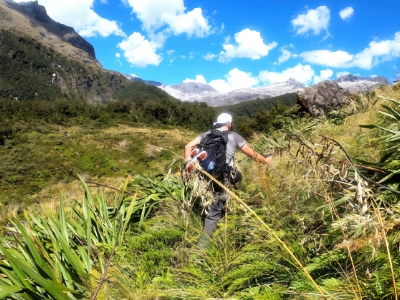
Once my gear had dried, I left the heavier items behind, taking only a light day pack with me. With the sun high above, I crossed a river and entered a dense rainforest on the far bank. The thick canopy provided some shade, but after half an hour, I emerged from the forest and found myself in a steppe, dry and harsh, dotted with thorny bushes and tall speargrass. The grass, with its sharp tips, sliced at my skin like unseen blades, leaving cuts that smarted in the heat. The air was thick with the sun’s intensity, and my progress slowed as I navigated through the parched landscape, mindful of every step.
For two hours, I battled the thorns and speargrass, each step an effort. Eventually, I came upon a small stream, flowing clear and cold from a glacier high above. Here, I replenished my water supply and took solace in the refreshing pool, its crystal waters a balm to my weary body. I lingered in the cool embrace of the stream, feeling the weight of the sun's heat dissipate from my skin.
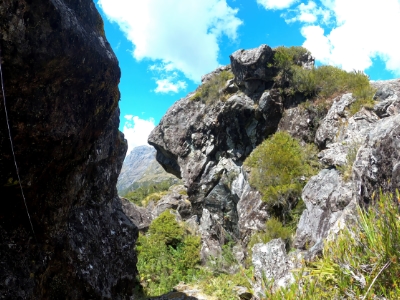
Refreshed, I continued my journey, and the terrain changed once more. I found myself amidst a rocky hill, the ground scattered with massive boulders, some the size of houses. For another two hours, I clambered over these stones, my path slow and uncertain. It was here that a great spider's web, two meters across, caught my eye, its delicate strands adorned with droplets of water that sparkled in the sunlight like diamonds. In its center sat a small spider, no larger than a coin, yet commanding a presence in this world of stone. My thoughts turned to tales of old, to Frodo and his passage through the perilous web-strewn caverns. Yet I was not in Tolkien's world but my own, so I carefully ducked beneath the web, marveling at its beauty and the life it harbored.
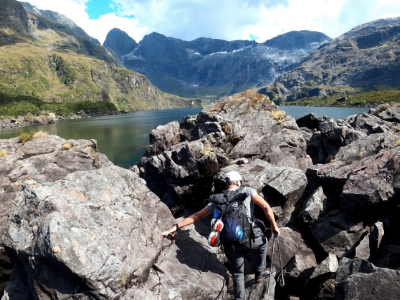
At last, I emerged from the maze of boulders and stood on the edge of a cliff. Below me lay the vast expanse of Lake Adelaide, the goal of my journey. The descent was steep, and as I carefully made my way down, I passed bushes laden with Totara berries, small red fruits with delicate green tips. Their sweet, coniferous taste was like nothing I had ever known, and I savored them as I continued my descent. Foraging, I thought, connected me to this land in a way no provisioned meal could; it was a communion with the earth, a deep immersion into the natural world.
Finally, I reached the rocky shore of the lake. The scene before me was as though drawn from a painter’s hand: the lake’s still waters mirrored the surrounding cliffs, moss-covered in vibrant hues of green and red, while on the opposite shore, a sheer granite wall rose high, its surface dark and imposing. Above, the sky was streaked with cirrus clouds, their shapes mystical, as though placed by unseen hands. The lake itself, a mirror of blue and green, reflected the world above and below, with fish darting just beneath its surface, bringing life to this quiet tableau.
I undressed slowly, laying my clothes on a sun-warmed rock to dry, and without hesitation, plunged into the clear, inviting waters of the lake. After the long, exhausting trek under the relentless heat of the sun, the cold water was a shock, a bracing contrast that sent a wave of exhilaration through my body. The lake’s chill enveloped me, and within seconds I could feel my skin tighten, retreating from the cold as if seeking refuge within itself. I swam quickly, cutting through the water with eager strokes, but the cold soon drove me back to the shore. As I emerged, the hot sun and a light, gentle breeze greeted me, wrapping me in an invisible embrace of warmth. It was as if nature itself was offering solace, as though the sun and air had conspired to revive me. I stood there for a moment, marveling at the contrast—the crispness of the water still clinging to my skin, and the heat of the sun soothing my chilled body.
The sensation was so invigorating that I couldn’t resist the call of the water. Without a second thought, I jumped back in. This time, my body had grown accustomed to the temperature, and the initial shock of cold was replaced with a sense of calm. I swam further out, the lake stretching infinitely before me, as I turned onto my back and let myself float. There, with my arms outstretched and my body buoyant on the water’s surface, I looked up at the sky, closing my eyes and letting the sun’s rays filter through my eyelids. The warmth of the sun above seemed to balance the cold depths below, creating a perfect harmony.
I floated effortlessly, feeling as light as the breeze itself, as though gravity had relinquished its hold on me. The gentle murmur of the water as it rippled around me was a soothing lullaby, its cadence calming my mind and body. With my eyes closed, the sunlight danced across my vision, casting shimmering patterns of light and shadow on my retina, like celestial paintings drawn by unseen hands. In those moments, suspended between sky and water, I felt as though I had stumbled upon a paradise that others only dream of. It was not the Eden of myth, lost and irretrievable, but a living paradise, right here in this remote wilderness, waiting to be found by those willing to see it.
Time lost all meaning as I lay there, floating weightless in the cool waters, embraced by nature’s quiet majesty. It was the kind of peace that dissolves the boundaries of self, where the distinction between body, water, and sky fades away, leaving only the sensation of being—of existing purely and completely in the present moment. I could have stayed there forever, cradled by the elements, had not nature, in her subtle wisdom, reminded me that such bliss cannot last indefinitely.
It was a small fish, darting up from the depths, that brought me back to the world of motion and sensation. The tiny creature, curious and bold, nipped at my hair, startling me so that I almost leapt from the water in surprise, much like a startled dolphin breaching the surface. I laughed, filled with a boyish glee at the playful interruption, and in that moment, the stillness of my meditation gave way to a burst of energy. I dove beneath the surface, chasing after the fish, my body cutting through the water with newfound vigor.
As I swam deeper, I was struck by the beauty that lay beneath the surface. The lake’s bottom, a dark granite bed, was streaked with a shimmering vein of white marble, winding through the stone like a secret pathway. The water, though cold, was crystalline, revealing every detail of the underwater world in vivid clarity. Large boulders of various shapes, smoothed by time and water, rested in peaceful silence, while strands of algae swayed gently in the current, releasing tiny air bubbles that shimmered like jewels as they rose toward the light. The entire scene was bathed in a kaleidoscope of light, with the sun’s rays refracted through the water’s ripples, casting shifting patterns of brilliance over the lakebed. It was a world unto itself, quiet and untouched, where time moved differently and where every detail seemed infused with a quiet, sacred beauty.
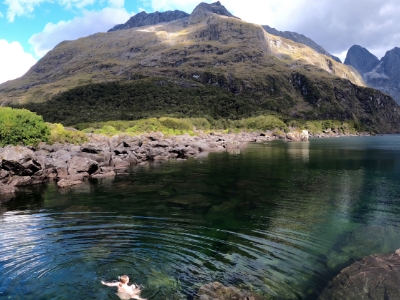
I swam and dove with the exuberance of a child, losing myself in the sheer joy of movement and discovery. The lake, cold and pristine, seemed alive with hidden wonders, each dive revealing some new marvel, some quiet corner of beauty waiting to be uncovered. The hour passed unnoticed, and when I finally emerged, breathless but deeply content, I felt as though I had been initiated into some deeper mystery of the natural world, one that could not be spoken but only felt.
Climbing onto a large rock, still wet from the lake, I sat in the sun, letting its warmth dry my skin. I ate a simple lunch, the food tasting richer, more satisfying after my time in the water. And then, lulled by the rhythmic lapping of the waves against the shore, I lay back and drifted into a peaceful sleep, the kind that only comes when one is truly at peace with the world.
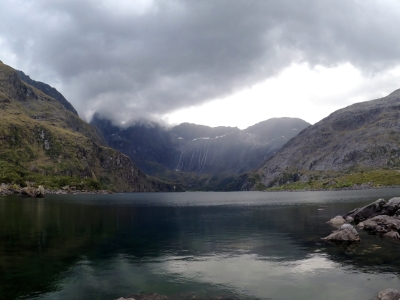
I was awakened by a deafening clap of thunder that reverberated through the valley, shaking the very air. I sat up in alarm, my eyes drawn to the sky above the black mountain range that loomed across the lake. A colossal dark cloud, thick and foreboding, had gathered there, blotting out the light and casting the mountain in shadow. The heavens, swollen with rage, began to release torrents of rain that hammered down upon the sheer rocky face of the mountain. What had been tranquil and dry just an hour before was now transformed into a wild and furious cascade. The once-silent couloirs, carved by time and wind, now roared to life, channeling torrents of water that plunged violently into the lake below. I could see the force of it—the way the water hit the lake, sending ripples and waves outward, as though the mountain itself were weeping, unable to contain its burden any longer.
As I watched, mesmerized and powerless before this display of nature’s fury, a thick, impenetrable wall of rain descended from the sky, swallowing the mountain whole. It moved towards me with a slow, ominous inevitability, as if the heavens were advancing to lay siege upon the earth. The scene was both magnificent and terrifying, a reminder of nature's awesome power and our fragility in its midst. For a moment, I was paralyzed, my mind caught between awe and fear. The thought of that deluge sweeping over me, of being engulfed by the raw and untamable force of the storm, sent a shudder down my spine.
Realizing the urgency of my situation, I sprang into action. With shaking hands, I hastily packed my belongings, securing them as best I could against the impending downpour. I donned dry clothes, though I knew they would soon be soaked through. There was no time for hesitation. The storm was coming, relentless and indifferent, and I had to flee. I began to run, my feet stumbling over the uneven ground as I made for the forest line on the northern edge of the lake. The air was thick with tension, the earth trembling beneath me as the storm closed in
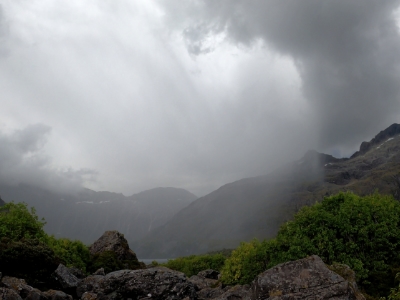
But then, as if by some strange mercy, the wall of rain halted. It came to a stop at the center of the lake, as though held back by an unseen hand. The storm, so fierce and overwhelming, was restrained, its fury unleashed only upon the opposite shore. I watched in disbelief as the rain that should have drenched me to the bone now fell as a mere drizzle. The monstrous storm, which had seemed destined to consume everything in its path, had spared me, leaving me standing on the shore, untouched by its wrath.
In the days that followed, I learned that this thundercloud was merely the edge of a vast tempest that had swept inland from the Pacific Ocean, unleashing floods and destruction along the coast. Bridges were washed away, rivers overflowed, and the land itself seemed to groan beneath the weight of the storm’s fury. Yet there I had stood, a solitary figure at the edge of a lake, witness to the grandeur of nature’s spectacle without falling victim to its destructive power. It was as though I had been given a glimpse of something both terrible and beautiful, a reminder that while we are small in the face of nature’s immensity, there are moments when it allows us to stand on the precipice, to observe its might without being consumed by it.
In that moment, I felt a deep humility, a recognition that life is fragile, yet resilient, and that the world moves with forces far greater than ourselves. To witness such a storm from the safety of the shore is a rare and profound gift, a reminder that nature, in all its majesty, holds both creation and destruction in its grasp. And on that day, I had been spared, allowed to see the storm without becoming its prey.
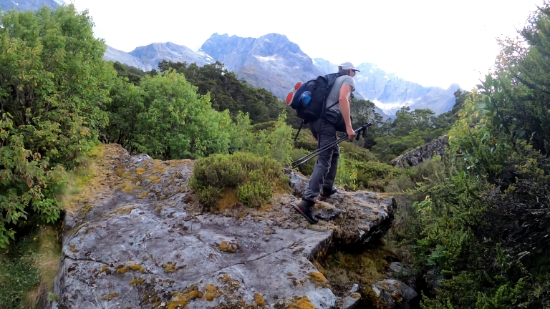
I decided to take a shortcut back to my camp, straight down a steep slope draped in dense jungle, the kind that thrives on the edge of wilderness and stretches as far as the eye can see. The lake’s serene beauty was behind me now, and ahead lay a wild, untamed descent that would prove to be the most exhilarating, the most intense chapter of my journey. I stood at the threshold of this chaotic labyrinth, where ancient trees twisted and intertwined as though they were locked in a dance only they understood, their branches bending in surreal forms like the imagined creatures of a forgotten dream.
The slope was nearly vertical, and every step felt precarious. I slid down with the agile, instinctive movements of a lizard, my hands clutching at the gnarled trunks and vines that seemed to spring up in every direction, offering me a lifeline in the tangled wilderness. The trees were draped in thick moss, its surface shining in the fading light with hues of yellow, red, and brown, as if the forest itself had been touched by a painter’s brush. My clothes quickly became soaked from the dampness of the moss, which clung to everything it touched, wrapping the jungle in a soft, moist embrace.
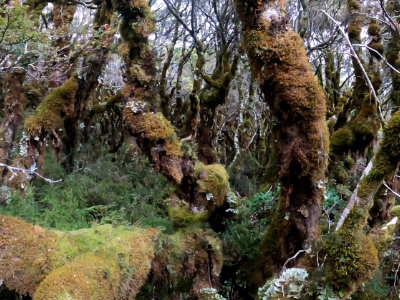
The air was thick and humid, like the interior of a Turkish bath, suffused with a faint mist that hung like a veil over the landscape. Every breath I took seemed heavier, richer, as if I were inhaling the very essence of the jungle. There was something about the warmth of the moss beneath my hands that made this descent feel almost pleasant—like crawling over the warm, living body of the earth itself. After my swim in the lake, my senses were heightened, every detail became a new discovery. Each time my fingers brushed against the mossy bark of the trees, it was as if I could feel the ancient life pulsing through the wood. The air was filled with an intoxicating fragrance of wet earth and decaying foliage, a scent both rich and strange, primal and comforting.
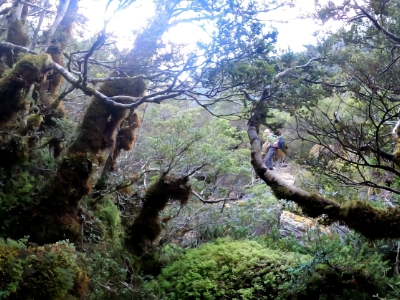
I pressed my face close to the moss, inhaling deeply, savoring the earthy perfume that rose from its depths. My eyes scanned the fantastical shapes around me, each more surreal than the last. The forest seemed alive, not just with the plants and creatures that lived within it, but with a kind of ancient consciousness, as if the trees and rocks held secrets that stretched back through millennia. My senses were on fire, alive to the beauty and the mystery that surrounded me. Every sound, no matter how faint, reached my ears with a clarity that was almost supernatural: the soft rustle of leaves overhead, the distant murmur of a stream, the occasional flutter of wings as a bird passed through the canopy. Even the insects, hidden in the undergrowth, seemed to hum with a barely discernible energy. I felt swift, nimble, moving with grace through the dense jungle, sliding over rocks and vines like a panther, attuned to the rhythms of the forest.
It was as though I had merged with the jungle, my body becoming part of its wild and tangled forms. In those moments, I was no longer a visitor, but an inhabitant of this primeval world, and the world welcomed me as one of its own. Yet, even in this state of heightened awareness, nature reminded me that I was still vulnerable, still bound to my mortal body.
Suddenly, as I pushed through the thick undergrowth, my foot slipped. I teetered for a moment, the ground seeming to give way beneath me. I caught myself just in time, and as I regained my balance, I saw it: a gaping hole, black and ominous, hidden beneath layers of rotting wood. The earth around it had been slowly consumed by time, turning into a soft, decaying mass that could easily have swallowed me whole. The sight of that dark cavity sent a chill down my spine. I crouched at its edge, peering into the abyss that stretched out before me—a vast, yawning chasm formed by generations of fallen trees, now nothing more than fossilized wood and peat. It was a place where the forest’s dead went to rest, sinking into the earth to form these ancient, organic caverns.
The thought of falling into that dark, silent void filled me with a primordial fear, an instinctive terror that rose from the deepest recesses of my mind. The damp, rotting dungeon that lay below me was a reminder of the earth’s slow but inevitable decay, of the way life itself returned to the soil in a never-ending cycle of birth and death. For a moment, I stood paralyzed by that thought—by the realization that, in the end, all paths lead to the same destination, the same final darkness. The forest, once a place of beauty and wonder, had transformed in an instant into something more menacing, a place where the boundary between life and death felt fragile, where the earth itself seemed to remind me of my own mortality.
Cold sweat beaded on my skin, and I shuddered at the idea of disappearing into that silent void, lost forever in the damp, rotting depths of the earth. The abyss below me seemed to whisper ancient truths, as if some hidden part of the forest was playing a solemn requiem on the strings of my soul. It was a song of futility and hopelessness, a reminder that no matter how high I climbed, no matter how far I traveled, the final destination was always the same: the inescapable darkness of the unknown.
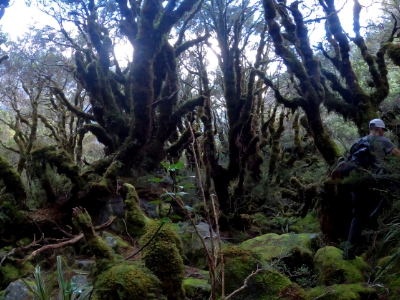
But as I stood there, teetering on the edge of that dark abyss, I felt something else stir within me—a deep, abiding gratitude for life itself. The fragility of my existence, the precariousness of every step I took, only made the present moment more precious. I was reminded that life’s greatest gift is not its permanence, but its fleeting, ephemeral nature. Knowing that each day could be my last only deepened my resolve to live fully, to embrace each moment with joy and awareness, without wasting time on the trivialities that so often cloud the mind.
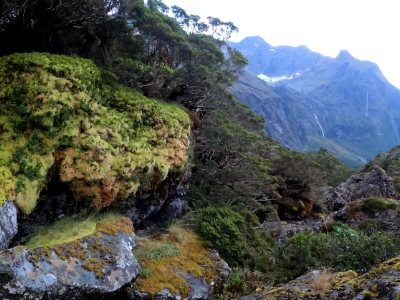
With renewed determination, I stepped back from the brink, my heart still racing but my mind clear. I had faced the darkness, felt its cold breath, and now I returned to the living world with a deeper appreciation for all that it had to offer. The forest was no longer a place of fear, but a reminder of the fragile, beautiful dance of life and death that played out in every corner of the natural world. I moved on, carefully navigating the jungle, aware of both its dangers and its wonders, my senses sharpened, my spirit lightened by the simple fact of being alive.
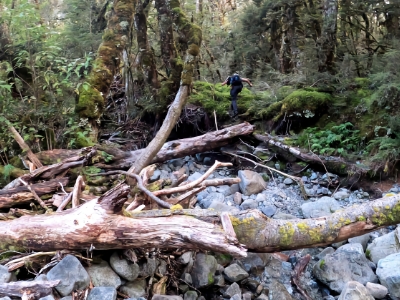
After hours of crawling through this surreal jungle, I reached a riverbed. I rested briefly, drank deeply from the water, and pressed on. The jungle became nearly impassable, filled with fallen trees of immense size, their trunks covered in thick moss and ferns. It felt like a journey through a fairy tale, both wondrous and foreboding.
As dusk fell, I finally emerged onto flat ground. The river that separated me from my camp lay ahead, its waters turbulent from the recent rains. I removed my boots and waded through, stepping carefully on the stones beneath the surface. When I arrived at my camp, the sun had begun to set, casting the sky in fiery red hues.
Soaked and mud-streaked, I decided to take one final plunge into a nearby stream before night fully descended. The icy water, flowing from the glacier, carried me swiftly downstream before I pulled myself ashore.
As night enveloped the world, I made a fire and prepared my meal. After eating, I lay in my sleeping bag, gazing up at the sky. The stars were bright, the Milky Way arcing overhead, and the sounds of the night—the distant croak of frogs, the occasional rustle of leaves—lulled me into a deep, peaceful sleep. Tomorrow, the long road back would call me, but for now, I was content, cradled in the arms of nature.
As I awoke the next morning, the wilderness was bathed in the soft light of dawn, a calm serenity hanging over the landscape. The journey back lay ahead of me, but I did not rush to greet it. Instead, I lingered, reflecting on the quiet profundity of the days past. Each step through the tangled forest, each drop of dew upon the boulders, each plunge into the crystal waters of Lake Adelaide had been a reminder of the harmonious simplicity of nature. In the wilderness, life reduces itself to essentials—air, water, the earth beneath your feet—and in that reduction, one finds true freedom.
Nature, in her endless patience and quiet persistence, reveals the foolishness of our hurried lives. How often do we labor under the weight of unnecessary burdens, constructing our own webs of complexity, forgetting that the world offers all that is needed in its rawest form? Out here, the luxury of the wild is not found in possessions or comforts but in the act of being present, of allowing the mind to rest in the stillness of the moment.
The cliffs, the forests, and the waters spoke to me in ways that human voices never could. They reminded me of the constancy of the earth beneath our feet, of the cyclical nature of life, and of the smallness of man’s brief passage through it. I marveled at the spider’s web that I had so carefully crawled beneath, a creation as fragile as it was intricate, suspended between two stones like a bridge between worlds. And yet, it endured, as all things in nature do—balanced, efficient, eternal in its own way.
What, then, is the purpose of our restless pursuits if we cannot find peace in stillness? The lake did not strive to be beautiful, nor did the trees strain to grow; they simply were, and in being, they were perfect. Man too, I believe, must learn to dwell in simplicity, to strip away the excesses that cloud his mind and obscure his purpose. In the quiet woods, I felt more myself, not because I was away from the world, but because I was closer to it, closer to the essence of what it means to live deliberately, with intent and awareness.
As I packed my things and began my descent from the highlands, I carried with me not just memories of the journey, but a renewed sense of purpose. There is a richness in solitude, a clarity in quiet observation, that the bustle of society cannot provide. Perhaps that is why I am drawn to these places, to the lakes and forests that ask nothing of me but to be still and to listen. In their silence, I hear the voice of wisdom—the knowledge that life’s meaning is not found in its noise, but in the spaces between.
And so, with the wilderness at my back and the world ahead, I stepped forward, knowing that while I must return to the world of men, the lessons of the wild would remain with me always, quietly guiding me toward a life lived with simplicity and purpose, as nature intended.